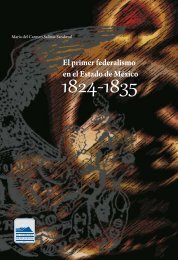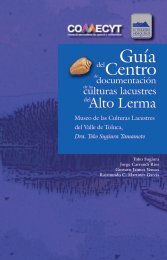You also want an ePaper? Increase the reach of your titles
YUMPU automatically turns print PDFs into web optimized ePapers that Google loves.
NICHOLE SANDERS, CATHOLIC WOMEN AND PATRIOTISM: ACCIÓN CATÓLICA MEXICANA<br />
AND WOMEN’S ORGANIZING IN WORLD WAR II<br />
While women of the UFCM and JCFM did not<br />
negate motherhood as the most important<br />
role for women, these organizations nevertheless<br />
left space for professional women to<br />
participate as well. Professional women had<br />
important skills necessary for the defense of<br />
the country, just as mothers had a central<br />
role to play in raising future citizens. Women’s<br />
relationship to the state in the 1940s<br />
was complex and evolving.<br />
Conclusion<br />
While Mexico’s entry into World War Two<br />
was not initially supported by many Mexicans,<br />
particularly conservative Mexicans,<br />
the sinking of the Potrero de Llano shifted<br />
opinions. The Catholic Church, pleased with<br />
the olive branch offered by President Manuel<br />
Ávila Camacho, moved to back the<br />
Mexican declaration of war. With Church support,<br />
women involved in Catholic lay organizations<br />
organized to contribute to the war<br />
effort, and began to define their own views<br />
of citizenship in terms of patriotism. According<br />
to some, good Catholics supported the<br />
patria, and this included the government’s<br />
call to war.<br />
Many Catholic women saw this as a<br />
chance to back a national project and define<br />
their own citizenship as being part of<br />
a community. Their work would support<br />
their community, and the patria, and they<br />
took advantage of the moment to incorporate<br />
themselves into national politics when<br />
they did not have suffrage. Nira Yuval-Davis<br />
points out that “collectivities and communities<br />
are ideological and material constructions,<br />
whose boundaries, structures and<br />
norms are a result of constant processes of<br />
struggle and negotiation, or more general<br />
social developments” (Yuval-Davis, 1997:<br />
73). For women involved in ACM, their use<br />
of a Catholic community organization to redefine<br />
their role in the national community<br />
shows how fluid definitions of community<br />
could be, and how women were central<br />
to redefining and negotiating community<br />
as a response to national and international<br />
events. They used, as Yuval-Davies states,<br />
general social developments in order to<br />
place themselves at the center of a national<br />
project. In doing so, they both redefined Catholics’<br />
role in the body politic, but also the<br />
role that Catholic women, especially young<br />
professional women, could play. While they<br />
may not have been able to vote, they could<br />
nevertheless belong to a community that<br />
was part of a national state-building project.<br />
Catholic women in ACM saw themselves<br />
as central to this community and defined<br />
patriotism as a reciprocal arrangement.<br />
Their community belonged to the larger<br />
patria, and since the country took care of<br />
them, they needed to repay this commitment<br />
through their virtue, discipline and<br />
faith. Catholic women, working though lay<br />
organizations, like the Damas Católicas, had<br />
always used charity work to claim space in<br />
the public sphere. They also used their positions<br />
in the home as guardian angels as a<br />
way to stake out moral authority. What was<br />
unique about the effort during World War<br />
II was the link to a broader national postrevolutionary<br />
political project. Catholic women<br />
in ACM took this opportunity to define<br />
themselves as not just good Catholics, but<br />
good Mexicans as well. Through their professional<br />
work in civil defense, they redefined<br />
patriotism in a way that centered their<br />
Catholic values, and highlighted their contributions<br />
as women. To be a good patriot,<br />
according to these organizers, one needed<br />
to be a woman of strong faith, dedication,<br />
and virtue. By defining their participation<br />
in politics though their participation in their<br />
faith community, they were creating form of<br />
citizenship that privileged their faith. Their<br />
ability to tie their faith into the national project<br />
shows the extent to which relations between<br />
the Catholic Church and the Mexican<br />
government had thawed, and demonstrates<br />
the centrality of women to new ideas of Catholic<br />
citizenship.<br />
174



![bicentenario_1[V2]](https://img.yumpu.com/68677971/1/167x260/bicentenario-1v2.jpg?quality=85)
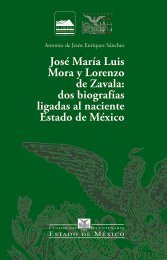
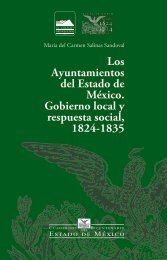
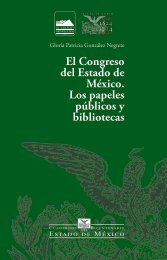
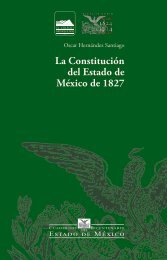
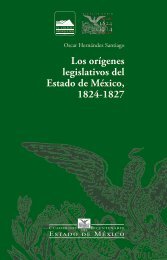
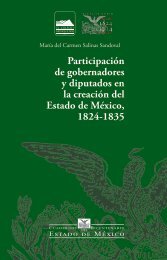
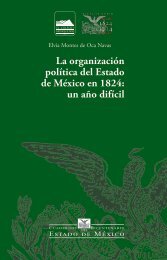
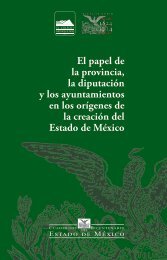

![El_primer_federalismoEM[final]_compressed (2)](https://img.yumpu.com/68483279/1/178x260/el-primer-federalismoemfinal-compressed-2.jpg?quality=85)
